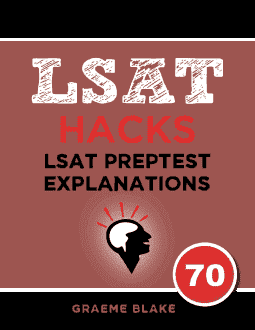QUESTION TEXT: Letter to the editor: You say that if the government…
QUESTION TYPE: Principle – Strengthen
CONCLUSION: The proposal is morally right.
REASONING: There's a proposal to confiscate burglars' wages. The money would go to a fund for burglary victims.
ANALYSIS: Principle – Strengthen questions are similar to sufficient assumption questions. The reasoning will be a bunch of facts about an idea. The conclusion will be that the idea is morally good.
Just look for an answer that says that one or more of the facts from the reasoning helps prove that something is morally good.
___________
- This tells you what to do if you steal money from a burglar or receive money stolen from a burglar. This answer doesn't tell you whether you should steal from a burglar.
Also, the money in the argument will go to a general fund for victims of burglary. So money taken from a burglar won't necessarily go to his specific victims. - This answer only places an obligation on burglars. That doesn't mean the Government has the right to force burglars to meet their obligations.
- CORRECT. The government program has a good motive. This answer shows that the motive is relevant.
To be clear, this isn't a sufficient assumption, it just strengthens the argument. - This sounds good, but it just gives us a necessary condition for justifying stealing. Necessary conditions never help prove a point.
Suppose you're wondering if you can drive from NYC to LA, and you've got a map. If I say “you'll only get there if you have a map”, have I helped you arrive? No! In fact, I've restricted you. Now, if you lose your map, you're lost. Before I added the condition, the map was just a nice bonus. - This contradicts the argument. We're trying to say that stealing from burglars is justified.


I think I see another reason we can eliminate A and B! Both specify that money would go from burglars to their specific victims- but the stimulus talks about creating a general fund for victims of burglary. It doesn’t specify which victims it will go to. It might go to a victim whose burglar was never caught.
What do you think?
Great catch! That’s a very real distinction between the stimulus and A/B.
My Analysis –
Principle- Strengthen
Conclusion – If wages confiscated to compensate victims —> justified
Reasoning – Even if confiscation is stealing, it is justified as it compensates burglary victims.
Anticipation – I was stuck between C and D but finally chose C which is the right answer. Although I chose C, I was not sure why I eliminated D. I spent around 2 minutes on this question.
Is D wrong because it says Justified —–> compensates those who deserve. which is the reverse of the stimulus?
Yes, exactly. (D) is wrong because we’re looking for something that will help us conclude that the stealing was justified, i.e. we need “justified” to be on the other side of the arrow.
I’m sorry, but answers like these kill me. A, “good”, motive. My problem with LR, one of many, is that I read general answers like this and think: LSAC doesn’t expect me to define good, as if I would agree that my good is, by equanimity, their “good”.
The stimulus said “it would still be justified”. So the letter author thinks the motive is good. C proves that the motive is relevant.
This is a “support” question, rather than a sufficient assumption. So this question doesn’t require you to define good – it just requires you to accept the letter editor’s moral framework and work within that.